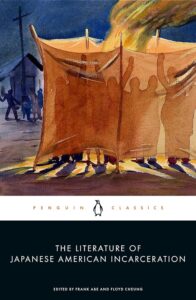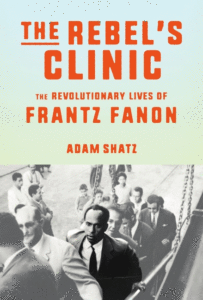
Our basket of brilliant reviews this week includes Colin Barrett on Scott Preston’s The Borrowed Hills, Hua Hsu on The Literature of Japanese American Incarceration, A.O. Scott on Joseph O’Neill’s Godwin, Merve Emre on Frank Tallis’ Mortal Secrets, and Ken Chen on Adam Shatz’s The Rebel’s Clinic.
“The first third of The Borrowed Hills unfolds with a pleasurable, slow-burn assurance. An Oedipally inflected saga of intergenerational retribution seems to be unfolding, bound by the slipknot logic of Greek tragedy: The closer Steve gets to what he wants, the closer he is to destroying it. The more William tries to evade his fate, the larger it looms. Then Preston changes focus and genre … What follows is an antic procession of action-movie clichés: Murder threats are made at the drop of a hat, robberies go wrong and policemen are executed. There are chases across the fells and armed standoffs. On multiple occasions, a villain pauses while on the verge of delivering the killing blow to gloatingly declaim his imminent victory, only to be foiled at the last possible instant. Once the Tinley plot reaches its blood-soaked conclusion, the novel gets back on track, returning to the original cast in its elegiac final third … At its most resonant and powerful when the human drama does not overwhelm, but takes its proper place in the pitiless and timeless landscape on which all of nature’s tenants—man and animal alike—live and die.”
–Colin Barrett on Scott Preston’s The Borrowed Hills (The New York Times Book Review)

“… an essential volume that collects more than fifty accounts of Japanese life before, during, and after the war. The title alone is a bold assertion of identity: for decades, the wartime incarceration of the Japanese was described in euphemistic terms such as ‘relocation’ or ‘internment.’ And Abe and Cheung’s definition of ‘literature’ is admirably broad, encompassing letters, editorials, poetry, short stories, manga, and government documents. Although there have been many books written on the history of incarceration, few have captured the kind of emotional detail that comes through in the largely first-person accounts collected by Abe and Cheung. Their selections paint a complicated picture, convening hopeful, patriotic idealists, righteous firebrands, and downtrodden cynics … Some of the book’s most engrossing scenes come during the early days of relocation, when the Japanese had to take it on faith that they would one day be free again … what’s striking about Abe and Cheung’s collection, particularly in these moments of rebellion, are the modest hopes held by those incarcerated. ‘I just wanted to be who I was—a Japanese American, an American of Japanese descent, an American citizen,’ the poet and playwright Hiroshi Kashiwagi writes … Few of the writers in The Literature of Japanese American Incarceration expected to be read decades later, if at all. Some were merely keeping records for themselves. After the war, there was little hurry to revisit this moment of victimhood; the few who wanted to share their experiences with a broader readership found there was no real market for books about such a dark chapter of American history.”
–Hua Hsu on The Literature of Japanese American Incarceration (The New Yorker)
“It’s possible that you have encountered someone like Mark Wolfe, a restive 40-something in Pittsburgh who has, in his own words, ‘not fully recovered from a decade spent as an active member of the American intelligentsia.’ Maybe you’ve worked with this guy, slept with him, sparred with him on social media. It’s also possible that reading Mark’s alternately diffident and combative first-person narration in Godwin, Joseph O’Neill’s sharp and slippery new novel, will provoke a more intimate tremor of recognition, especially when he describes the intellectual milieu that formed him … Like Netherland, O’Neill’s sprawling tale of cricket and exile in post-9/11 New York, Godwin uses sports as a window on global realities that might otherwise be too vast or too abstract to perceive. This time, the sport is soccer, which draws Mark into a shadowy, transactional world of late-capitalist, post-colonial intrigue … The book bristles with offhand insights and deft portraits of peripheral characters. It is populous, lively and intellectually challenging, but also coy and not a little cagey, concealing the ball with intricate footwork and sly misdirection as it risks running out the clock of readerly patience … I wanted more—more of a reason to have cared about Lakesha and Mark, two of the more memorably vexed and vexatious fictional characters I’ve encountered in a while. This is a very smart book. I’m not sure that’s a compliment.”
–A.O. Scott on Joseph O’Neill’s Godwin (The New York Times Book Review)
“Tallis is not the first to give us a Freud for Vienna…but what Tallis lacks in novelty or political verve he makes up for in sheer entertainment, drawing inspiration from the briskly plotted intrigue of his crime fiction. Quotation is jettisoned in favor of dramatic paraphrase. Chapters are anchored by colorful Viennese personalities, including patients from Freud’s case studies—Anna O., Dora, Rat Man, Wolfman—and the melancholy aristocrats and philandering artists of his milieu. Reading Mortal Secrets is like waltzing around a crowded ballroom, past quivering gold leaf and sternly curved flowers, while your partner murmurs in your ear very elegant, very precise summaries of primal parricide and the topographical model of the mind … Among Freud’s biographers, there is much prurient speculation about his own sexuality. How erotic was his early relationship with the otolaryngologist Wilhelm Fliess, who propounded an intimate connection between the nose and the genitals? Did Freud have an affair with his sister-in-law Minna, who was prettier and more attentive to his research than Martha? On such points, Tallis is levelheaded where others have been foolishly excitable, like naughty boys peeking through keyholes. ‘The truth of the matter is that we can never know what really happened,’ he writes. Instead, he stresses what Freud repeatedly stressed: that psychoanalysis, in its encounters with so-called perversions, ‘has no concern whatever with such judgments of value.'”
–Merve Emre on Frank Tallis’ Mortal Secrets: Freud, Vienna, and the Discovery of the Modern Mind (The New Yorker)

“So long as colonialism endures, so too will Fanon’s critique of it, but his perpetual relevance can also be traced to a problem he presents his readers with: that of his charisma. No other political theorist sounds like Fanon, because no one else has written in a register so naturally attuned to both analysis and affect. His language is hyper-dense, muscular, barbed—force unleashed. Each sentence is a performance; each line advances with a tense, Beethoven-like straining, each word compressing an accusation, a worldview, and a social terrain of struggle … Once the colonized people freed themselves, they could create a new society, one that molted off the identities of colonizer and colonized. But until that happened, Fanon directed his gaze back to the West, to those worlds from which empire and its violence emerged. No one, he insisted, is innocent of colonial violence—not even those of us in the metropole who weep over the massacres our own nations helped author … Treating its subject with a healthy dose of veneration and criticism, Shatz’s book is also a remarkable work of intellectual synthesis: a comprehensive, readable introduction to Fanon’s writings that places his incredible life against the political and cultural debates that informed it … Airlifting Fanon from the purgatory of New Left nostalgia, Shatz instead puts him in conversation with Sartre, Albert Camus, V.S. Naipaul, and countless other literary figures … But this approach can have its costs. In his effort to demythologize Fanon as a revolutionary, Shatz sometimes obscures the reasons why Macey called him the ‘apostle of violence.’ In his own moment, Fanon’s most important readers were not literary figures like Camus and Naipaul—comparatively conservative writers whom Fanon likely never read—but the insurgents in the training camps of Che Guevara, the African National Congress, and the Palestinian fedayeen, as well as the Black Panthers, whose leader Eldridge Cleaver said Fanon’s words could be quoted by ‘every brother on a rooftop.’ This revolutionary Fanon is also in Shatz’s book, though often quarantined from its more humanist, almost liberal portrayal of Fanon as the creator of a literary oeuvre.”
–Ken Chen on Adam Shatz’s The Rebel’s Clinic: The Revolutionary Lives of Frantz Fanon (The Nation)

